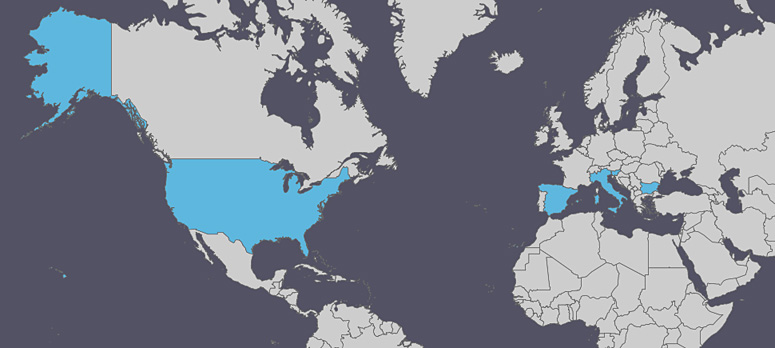
AM Charts
I did some light reading on time-use recently and came across some insightful observations from researcher John Robinson. He’s spent the last four decades reviewing thousands of “time journals” from people around the world.
Contrary to what you might think, Robinson argues we have more free time today than when he started keeping records in the ’60s, something The Atlantic corroborates. Only now we choose to fill that free time with overwork or busy-ness instead of proper leisure (e.g. relaxation, hobbies, or adventures) because that’s how many of us validate our existence.
A few highlights from Robinson’s research: People in Spain spend the most time walking (good for them!), Italians and Slovenians spend the most time relaxing (nice!), and Bulgarians (not Americans!) spend the most time watching TV (tsk, tsk). In the United States, people spend more time on computers than any other country, they volunteer more, and they spend the most time taking care of children and the elderly.
I suspect the increase in childcare is partially due to the rise of helicopter parenting. But those are mostly noble uses of American’s time, I believe. That is, of course, if we’re using computers to work smarter, work less, and facilitate really cool offline adventures.—Blake Snow
The story first published to blakesnow.com in 2014
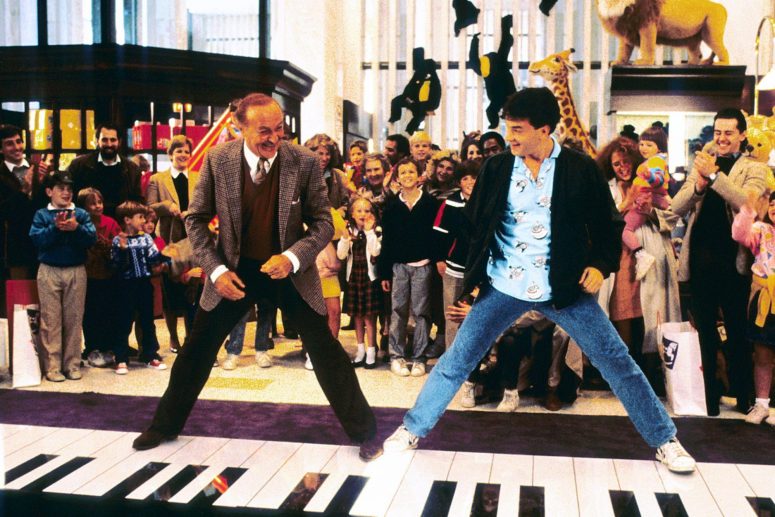
Courtesy 20th Century Fox
$375 an hour is a lot of money. It was even more money 20 years ago when a bougie investment bank paid me that to share my honest opinion with some of its biggest customers.
Many people don’t know this, but I got my start in writing covering video games of all things. It was the ideal subject for an early twenty-something like me. I threw myself into the “work,” was one of the most prolific tech bloggers for AOL (aka America On-Line), and had a blast attended game conferences, interacting with readers, and crafting sentences for a living. It was a lot like Tom Hanks character from Big. I was getting paid to play with toys and critique commercial art.
The pay wasn’t great. But when paired with magazine freelancing, it was enough to support my small, apartment-living family. I’m smiling right now just thinking about it. Continue reading…
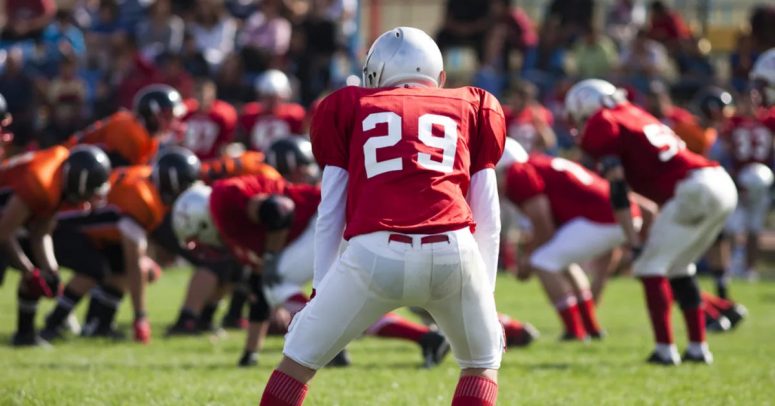
Courtesy Shutterstock
Much of my family enjoys watching football with me in the fall and winter. It’s the most TV we watch all year.
Between both college and pro, we’ve enjoyed a lot of exciting games this year. But one in particular stands out. And not because of the result.
Midway through the season, Washington (where my wife is from) nearly pulled off an incredible upset of a highly ranked team. It was back and forth football for a full four quarters. Really great stuff.
On the very last play, however, Washington lost.
That’s not the story that matters, though. A few moments after the game ended, my son Jack turned to his mother and I and said, “That was a close game. Good job to the team that won.”
I was so proud of him for not confusing loyalty with entertainment. Better yet, he’s already beginning to understand what it means to be magnanimous, an elusive trait that makes the world a better place.
I was proud of the example he set and hope to demonstrate the same attitude whenever my favorite team loses.
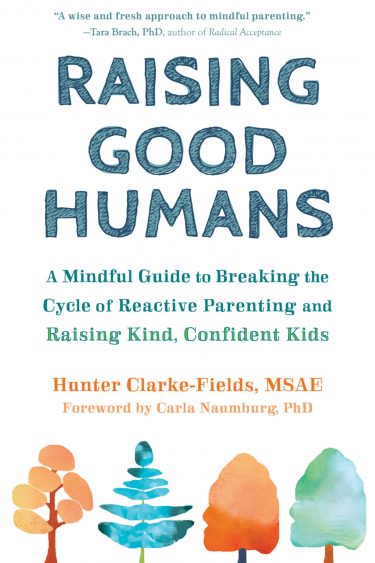 As the father of five kids, I take parenting very seriously. I used to read a lot of parenting books when my children were young, but I haven’t read any in recent years until stumbling upon Raising Good Humans by Hunter Clarke-Fields and Carla Naumburg
As the father of five kids, I take parenting very seriously. I used to read a lot of parenting books when my children were young, but I haven’t read any in recent years until stumbling upon Raising Good Humans by Hunter Clarke-Fields and Carla Naumburg
I didn’t like the workbook-like format and belabored thoughts on mindfulness, but I did enjoy several of the insights, especially as I’m increasingly raising teenagers over toddlers these days.
These are some of the lessons that stood out:
- You literally cannot access the rational part of your brain when your stress response is triggered.
- If you make your body seem less threatening, and speak in a calmer voice instead of yelling, you’ll have a less-stressed child—and you’ll get more cooperation.
- If we’re not fully present with our kids, we miss the chance to attune with their cues about what is happening for them under the surface. We might miss the signal that our children need a hug or help instead of more direction in this moment.
- Parental presence is key to optimizing the chance of your child having a life of well-being and resilience. “When you love someone, the best thing you can offer is your presence. How can you love if you are not there?”
- Instead of learning from the moment, their stress response bypasses the upper parts of the brain and causes children to fight back, talk back, withdraw, or run away. They are not “misbehaving” in these moments, they are experiencing a stress response.
- Feeling compassion for ourselves in no way releases us from responsibility for our actions. Rather, it releases us from the self-hatred that prevents us from responding to our life with clarity and balance.
- “Instead of teaching children how to consider their own needs in relation to the needs of those around them… we force children to do what we want because it seems more efficient, or because we lack the energy or skill to do it differently.”—Oren Jay Sofer
- “The greatest gifts you can give your children are the roots of responsibility and the wings of independence.”—Denis Waitley
- Simplify Schedules: Children (heck, all of us) need free time to balance out their activities, get to know themselves, and feel peaceful.
Rating: ★★★☆☆
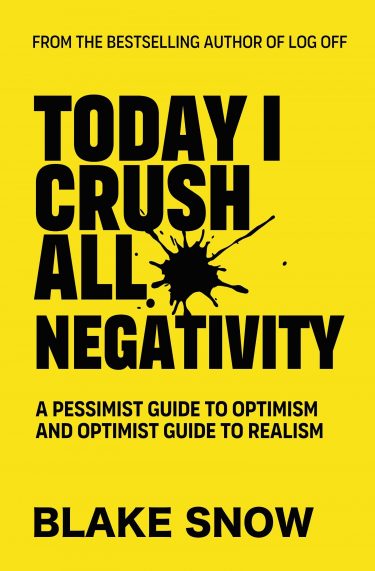
My third book is in the works
An old friend recently asked what I’ve been up to lately. Here’s the full answer as of this year:
- Freelance writing. I’ve been writing full-time for 17 years now. Since the Great Recession of 2009, however, writing explanatory tech and business stories for Fortune 500 companies has made up the bulk of my work. That continues today, writing mostly for software and consulting companies, as well as some travel publications for fun.
- Non-profit speaking. With the generous support of my good friend Craig, I started speaking to local elementary school students as part of my non-profit. We have more events planned in the fall, and it feels good to extend the movement beyond the book. Our first campaign includes giving away cool t-shirts to encourage people to “Live Heads Up.”
- Starting my third book. It’s called Today I Crush All Negativity, and it attempts to explain when and how to be optimistic and when and how to be pessimistic, regardless if you believe the glass is “half empty” or “half full.” If all goes to plan, I hope to publish the by the end of the year. I can’t wait for you to read it. I’ve interviewed a few billionaires for their perspective and hope to do the same with some homeless folks, too.
- Releasing my second album. I am so proud of it, promise it doesn’t suck, and hope you listen to it if you haven’t already. If you listen to just one song, make it “Sorta Social.” To promote the album, I even started a band to tour locally in Utah.
- Middle-age parenting. My family is rapidly becoming an older, adolescent family instead of the early childhood one its been for a long time. I can just feel it—and it feels special. I can talk to my older kids like an adult, and the younger ones are very independent. As part of that, I’m trying to deepen my relationships with them to hopefully avoid any future “daddy issues.” I feel encouraged by that and am closer to my wife than ever before.
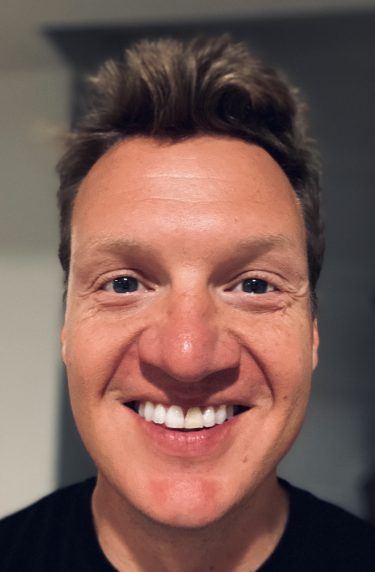 I was recently asked what I know for sure. I didn’t have time to answer everything in detail, but upon further reflection, this is what I would have told them.
I was recently asked what I know for sure. I didn’t have time to answer everything in detail, but upon further reflection, this is what I would have told them.
- We live on the most beautiful planet in the universe. There are over 400 million planets in our galaxy alone and an estimated 21 million more galaxies in the observable universe (i.e. the only part of space that we can see with telescopes and far reaching satellites). So far, we’ve only observed all brown, red, or blue planets with no water or diversity on them. We are literally living on a home that is 1 in several gazillion. The math doesn’t even make sense—it’s that rare, meaning there is a God or we won the greatest evolutionary lottery in the known universe. Either way it’s profoundly beautiful.
- Possessing a human body is a beautiful experience. I love the animal kingdom, but other species don’t hold a candle to the awesome existence of being a human. If you are reading this, again you won the universal lottery for most amazing species in the known universe. It. Is. Wonderful.
- Humans are inherently good. They can be trusted, they really do try, the sometimes change, and they will amaze you if you let them. Don’t let the lemons or fear mongers tell you otherwise. We would have not have gotten as far as we have as a species if that weren’t the case.
- The world is in good hands. On a similar note, people who say that youth cannot be trusted have no idea what they’re talking about because they only talk or listen to older people, especially loudmouth ones on TV. Having worked closely with youth for many years, they are even better than we are, just like we are largely better, more educated, more disciplined, and more empathetic than generations that came before us. Statistics bear this out, in fact. So don’t be old by saying the world is going to hell. It’s not, and younger generations will figure out the future just like we did, even if we don’t understand the new rules they play by. Continue reading…
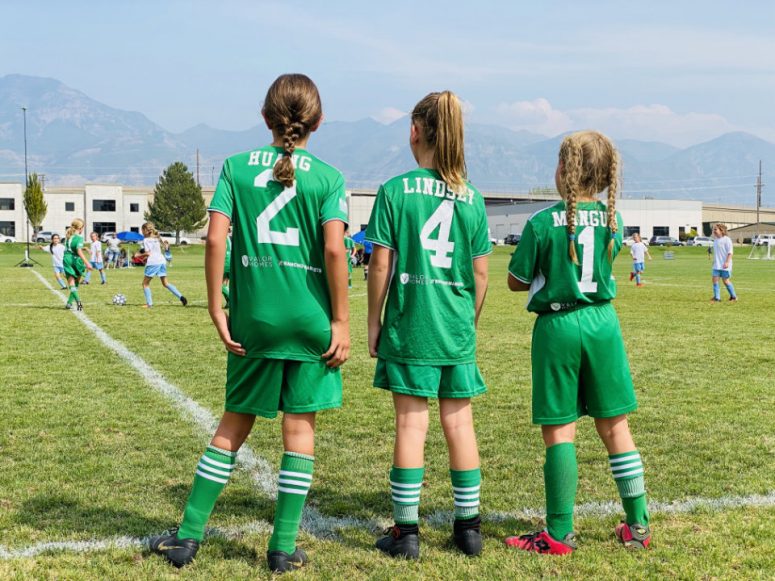
Business Insider recently compiled the latest research on how parenting styles affect our grown children. For example, according to the American Medical Association, Harvard, the University of Michigan, and others:
- Kids who do chores grow into more independent and responsible adults.
- Kids who are taught social skills end up graduating from college and earning more money.
- Kids who were told white lies by their parents have a lot more trust issues as adults.
- Kids develop low self esteem after watching their parents speak negatively about their own bodies.
- Kids with high expectations and nurturing parents get better grades in school.
- Kids who are taught how to verbalize feelings get fewer divorces as adults.
- Kids who are sheltered by their parents suffer greater anxiety as adults.
Parenting isn’t easy. But reading the above makes me want to double my efforts. The upside is far too great than giving in to a daily tantrum.
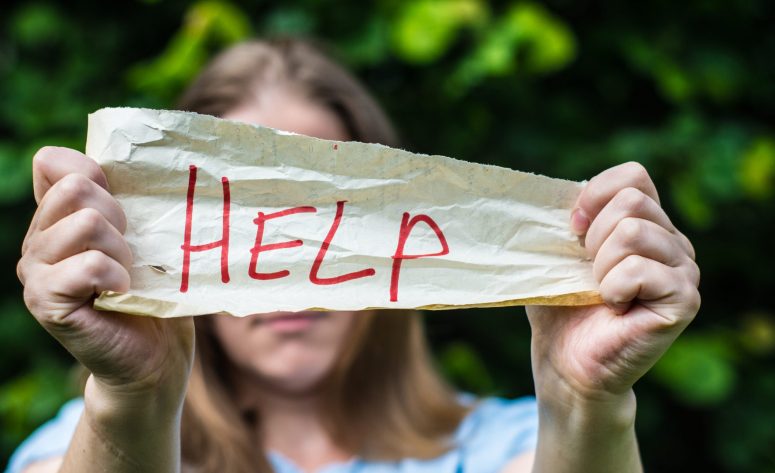
Courtesy Shutterstock
My daughter taught, if not reminded, me of an important lesson last week.
While driving home after dropping off one of her applications, I saw a homeless woman on the corner. At first glance, she looked like she might have been high or intoxicated, so I quickly drove past. Upon second thought, I turned to my kiddo and asked, “Do you think we should give our blessing bags (that we keep in the car) to homeless people that look high or might not benefit as much from them?” After a moment, Sadie plainly answered, “Dad, I don’t think we should ever judge a book by their cover.”
Of course she was right, so I quickly responded by turning around and driving back to the spot where the woman was standing. I handed Sadie a bag from the back of the truck. She rolled down the window to the approaching woman. “Here you go,” the former said to the latter.
It was dark outside but the street lamp was bright enough to reveal a woman with lively eyes, a completely sober demeanor, and a bright, appreciative smile. I felt warm inside and was proud of the example that my 14 year old had shown.
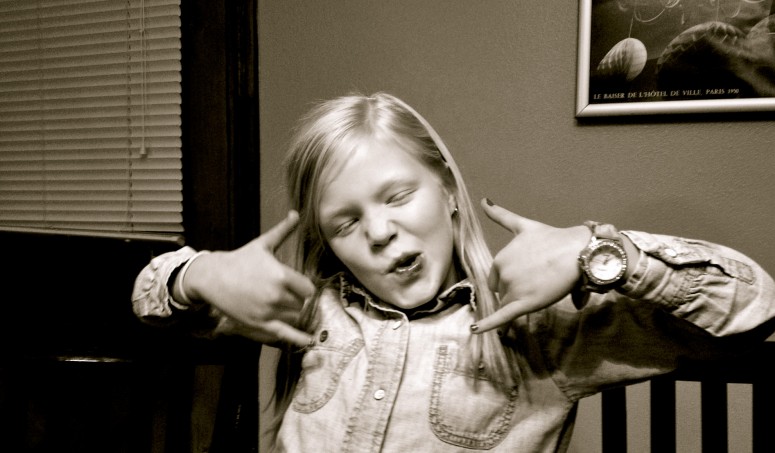
My sister-in-law challenged our family to a plank-off recently. Person who could plank the longest wins. “I don’t know,” I said. “I can’t stomach those things for 30 seconds.”
Or so I told myself.
Before continuing my story, a quick note: Like any inherently lazy human, there are a lot of exercises I hate doing. But planks are the worst—invented by Satan himself. They’re right up there with Turkish getups, mountain climbers, and wall sits as most uncomfortable for me. So I wasn’t enthused to participate.
“I’m in!” my wife said. My daughter, too, was excited to compete. “I’ll try,” I relented, offending Jedi Masters everywhere. Continue reading…
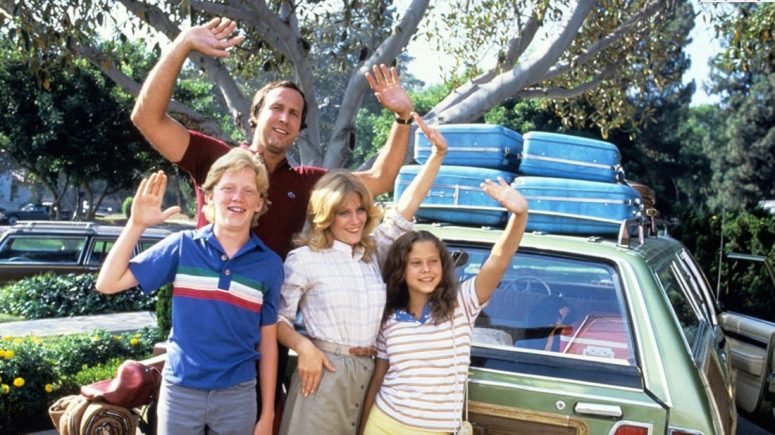
As parents for over a decade, my wife and I have forced a lot of dogma upon our five children. Some might call us total meanies for doing so. Nevertheless, here’s how we’ve indoctrinated them so far: Continue reading…

I have a confession to make—when it comes to raising a family, I don’t believe in “quality time,” a phrase you’ll often hear in America as justification for earmarking or designating an especially important encounter with children.
In truth, I just believe in time. And sometimes that time is nothing more than quantity. In other words, I try to be accessible and available to my children, even if I don’t have something particularly profound to say or a bond-worthy experience worth sharing. For example… Continue reading…
 How can parents help their children to manage and overcome stress?
How can parents help their children to manage and overcome stress?
The answer is resilience, according Barry Fell, an adolescent therapist and personal friend of mine. So to help our children overcome stress, we must first help them develop resilience.
Here are eight ways to do just that, according to Fell:
- Give your child as much responsibility as they can handle. Chores, taking care of themselves, making healthy choices on their own.
- Encourage age appropriate independence. Don’t do for your child what they should be able to do for themselves.
- Let your child experience appropriate natural consequences. This includes skinned knees, loss off friends stemming from bad behavior, and poor grades in school. Continue reading…
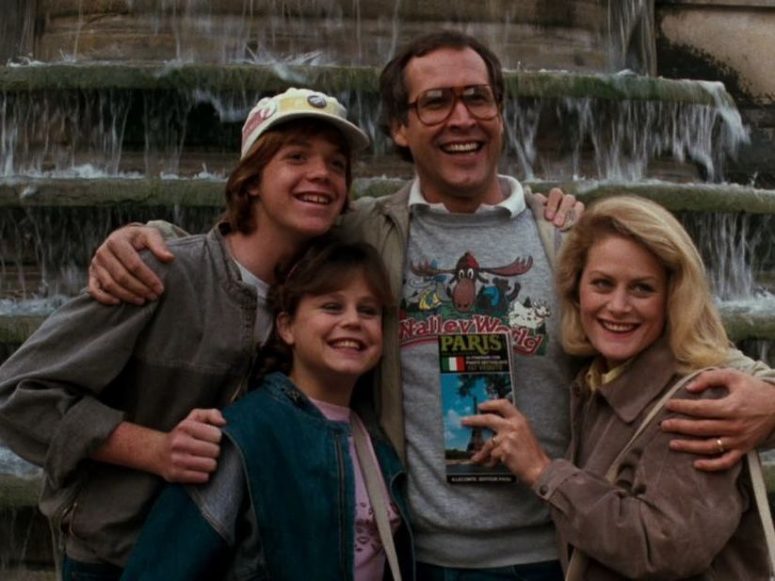
I was interviewed recently by The Atlantic about traveling with children, as an enthusiast of both endeavors. This is what I said:
Should parents forgo enrolling their children in summer school in favor of travel?
“While classwork is important, I haven’t encountered any evidence suggesting it’s more educational than actual travel,” says Blake Snow, a father of five, avid traveler, and author of Log Off: How to Stay Connected after Disconnecting. “In fact, the opposite is true; travel is a wonderful mechanism for educating kids both big and small.” (NOTE: My politically incorrect answer would be an enthusiastic, “Hell yes, you should, and maybe don’t ever send them to summer school unless they’re really behind!)
Do you worry about your children’s safety while traveling?
“I do, but not to the point of preventing us from visiting places that the State Department deems safe,” says Snow. “We’ve even gone to places with special advisories, such as Mexico and South Africa, so long as the alerts are no worse than ‘be extra careful.’ The world really is a lot safer than our irrational fears make it out to be, but I do believe in taking precautions and trusting what the State Departments says when it comes to keeping American safe while abroad.” Continue reading…
In many ways, modern parenting is a marked improvement over past generations. Many parents today are much more involved, supportive, gentle, and engaged in their children’s daily lives.
On the other hand, my wife and I have observed several not-so-good habits of contemporary parenting. They are as follows: Continue reading…
Below is an edited summary of Eric Barker’s excellent list written for TIME Magazine:
 Get happy yourself. How happy you are dramatically affects how happy and successful your kids are. So plan time each week to nurture your own relationships and hobbies.
Get happy yourself. How happy you are dramatically affects how happy and successful your kids are. So plan time each week to nurture your own relationships and hobbies.- Teach kids to build relationships. Encourage them to invest in relationships and perform small acts of kindness to build empathy.
- Expect effort, not perfection. Banging the achievement drum messes kids up. The research is very consistent: praise effort, not natural ability. Continue reading…

Photo credit: Blake Snow
I wholeheartedly agree with Cal physicist Richard Muller’s optimistic and informed answer to this question.
“Global warming does not threaten humans with extermination,” he writes. “In the history of the world, I would say now is the best time to be born. The problem of global warming is minuscule to the dangers faced by my parents when then had me (i.e. world wars, more tyrants, worse civil rights for minorities and women, more violence, poorer health, less economic wealth). We will handle global warming through mitigation and adaptation. Don’t deny your future children their opportunity to enter this wonderful world.”
I don’t think Muller, I, or any other optimists are delusional in that outlook. After all, history is on our side—humans are survivors, tinkerers, and self-improvers.
Statistically we’re collectively better off now than ever before. Read and try to refute this if you don’t believe me. There’s no looming threat suggesting others—only unfounded human fear, old age, or alarmists rooted in emotion (or self interest) rather than fact.
If you disagree with Muller, Louis Armstrong, or Viktor Frankl, you’re wrong.

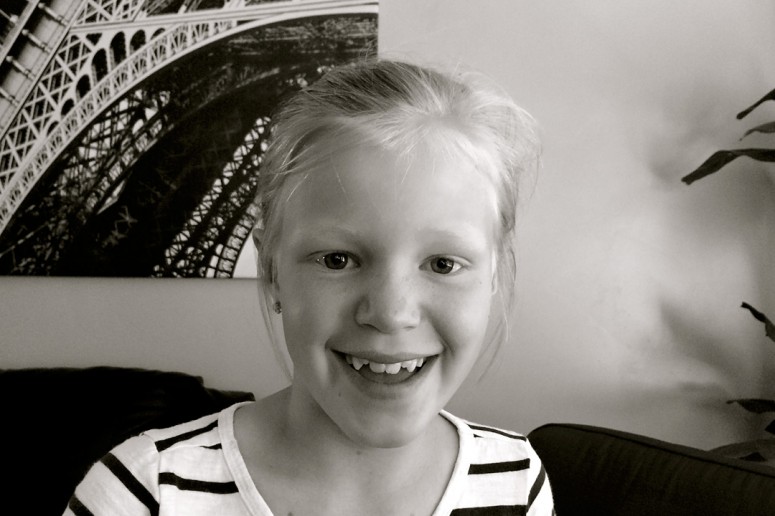
Photo: Blake Snow
Last month, my eight year-old daughter subdued me in a remarkable way.
Our dog Harley had just disobeyed orders. As I confronted him, he urinated on our floor for the umpteenth time.
Now, there are a lot of things I dislike about Harley. He pees like a girl. Recoils from house flies. And his nervous system is a little too nervous. But my least favorite thing about Harley is his knack for urinating a few teaspoons at times when I—the perceived “leader” of the pack—order or reprimand him.
It’s called submissive urination and it’s downright annoying for two reasons. First, I’ve had to clean up dog urine, several times a day, even though he’s been house trained for months. Second, I have no idea when to expect it, even though Harley is normally an obedient dog. Continue reading…
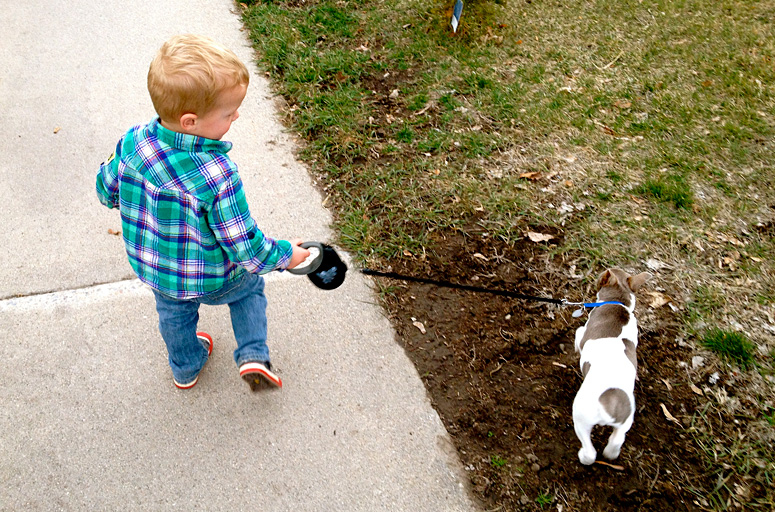
Blake Snow
There’s a funny saying in journalism. You could publish the biggest exclusive story in the world — a major political scandal, military coup, celebrity scoop, scientific breakthrough, or life-changing event. But it still won’t reach as many people as a cute story about a dog (See also: The AP Guide to News & Feature Writing).
I was reminded of this recently while walking my dog. Although I’ve walked the block many times with my adorable toddlers, one neighbor in particular never took much notice when crossing paths. No biggie. I just thought she was a private but pleasant lady. She’d smile; sometimes wave. We waved back. That was the extent of it for nearly four years.
Until she met Harley. Continue reading…
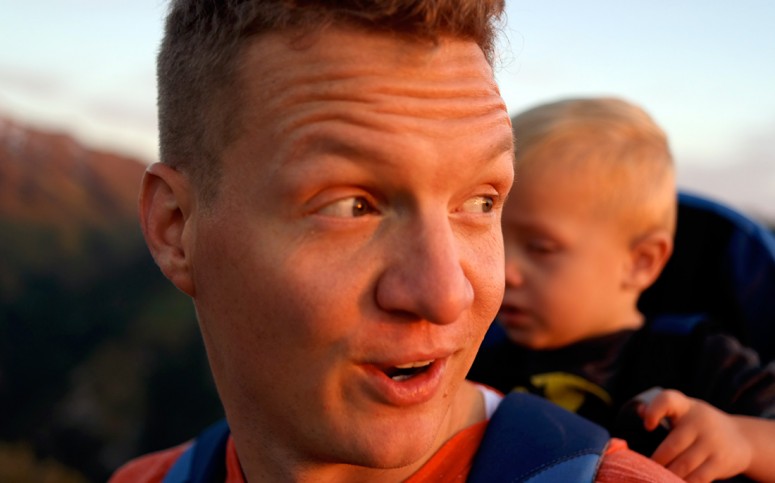
Excepting more embarrassing personal stuff, here are the changes I hope to make next year:
- I’m gonna speak softly to my kids. I’m loud. With my choice of words and opinions as much as my volume. Children don’t need that extra emotion as they’re figuring out the world. Often times I bark at my kids when they make a mistake or disobey. On a whim recently, I tried something different. Instead of scolding my three year old with a mean face and verbal outburst, I kneeled down, leveled my eyes with hers, softly expressed my disappointment, and encouraged her to change. She lovingly accepted and immediately improved her behavior. After overhearing the exchange, her older sister said, “Dad, I like when you talk to us like that. I feel a warm spirit in the room when you do that.” Then this happened. Then I resolved to speak kindly when disciplining my children from that day forward. Continue reading…
[youtube]https://www.youtube.com/watch?v=yRqUTA6AegA[/youtube]
It’s difficult to describe the love/hate relationship of raising humans. This Coca Cola commercial from Argentina does a pretty good job. (Thanks, Bella—via Facebook)
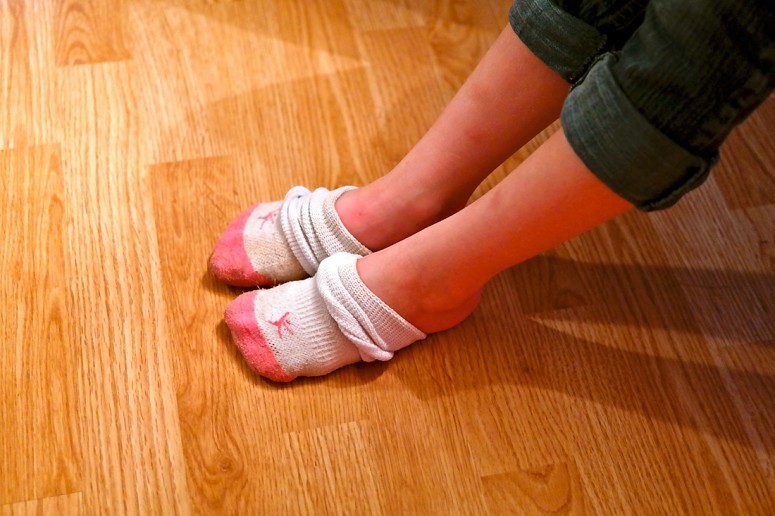
Blake Snow
See how my daughter is wearing her socks? I’m the only other person I know that does that, particularly if my ankles get hot.
Your ankles get hot? Yeah, my ankles get hot.
The complexing thing about this behavior, however, is that I haven’t “half socked” in years, certainly not since my daughter was old enough to notice. “Where did you learn to do that??!!” I asked in amazement the first time I witnessed her doing it. “I don’t know,” she shrugged. “Why?” I followed up. “Because my feet were hot.”
Maybe my daughter did observe me doing it and followed suit. Maybe she saw some other weirdo do it and mimicked them. I don’t doubt other explanations.
But maybe, just maybe, my daughter did it because her genetics told her to. Maybe, just maybe, human offspring remember select quirks that having nothing to do with evolution and everything to do with social continuity.
As a father, it was an exhilarating connection that I imagine gets better with age.

“I don’t mean to alarm you, but she may have brain cancer.”
That’s the scariest thing I’ve ever heard as a parent. Uttered to me by a confused pediatrician after failing to diagnose my two year-old daughter for the umpteenth time, the sentence dashed my hopes and struck fear in me like no other.
It started like this. Two weeks prior, my daughter began vomiting in her sleep. Curiously, she would upchuck like clockwork — three hours after bed. After a few days, she begin dropping weight. Her eyes sunk in. She looked sicker than any of my children had before. Continue reading…
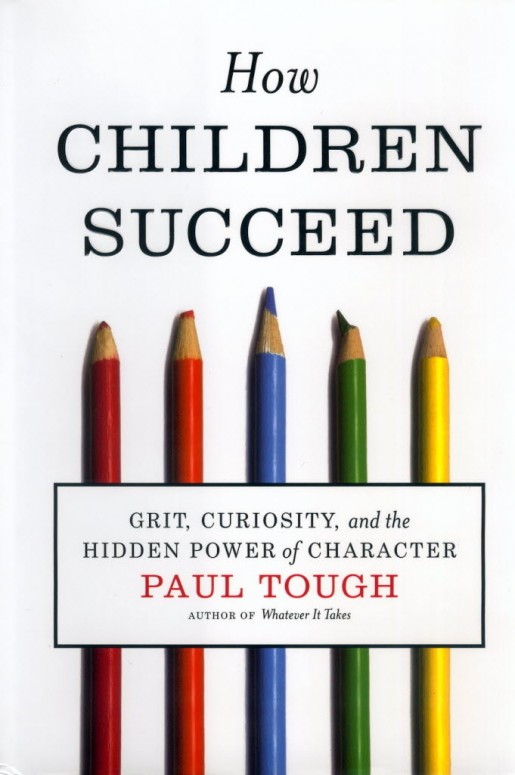 Build character, not intelligence. That’s the gist of what parents, educators, and society should do to help children succeed, argues Paul Tough in his new book.
Build character, not intelligence. That’s the gist of what parents, educators, and society should do to help children succeed, argues Paul Tough in his new book.
Many of Tough’s “findings” are obvious, mind you. More scientific validation of common sense than childrearing enlightenment, at least for balanced parents.
Nevertheless, Tough succeeds in synthesizing some important focal points for raising upstanding kids. Here they are, with my added commentary:
- Let children fail. It’s tempting to want to force a child to learn from yours and other’s mistakes. Life doesn’t work that way. You should certainly own up to your mistakes while showing them others’ and hope the child listens. But you must respect a child’s right to fail. It’s the only way they’ll feel the full experience of life. Let them own their failures as much as society lets them own (if not coddles) their victories. And let them know that failure is not who they are, it’s just something they do en route to winning. Continue reading…
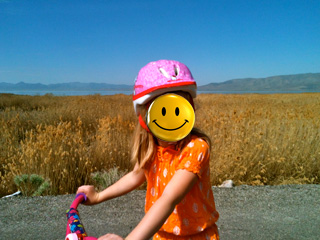 With a little help from her mother and I, our second child learned to ride a bike last week.
With a little help from her mother and I, our second child learned to ride a bike last week.
As she darted ahead of me into the horizon, I thought to myself, “She’s beautiful. The world is in good hands. This little gipper is gonna be alright.”
That all changes in teenage years, I’m told. But I’ll be damned if I’m not going to fight for her innocence as long as I can, then treat her like an adult as soon as she is mentally able. (I’ll be on my best guardian behavior, world—I swear it.)
But I digress. The experience reminded me of other sappy moments that have defined my short stint as a father. The first time your child smiles at you or says your name. Their first wobbly steps, subsequent hard fall, and immediate resolve in getting back up. The first time they excitedly greet you at the door. The first time you read a book in their class or celebrate an award they won on their own merit without any prodding or helicoptering by you.
Their first dance recital. The look on their face when they solve basic math. The first time they read a book, let loose on the dance floor, or help a younger sibling or child without being asked. The time my toddler son grabbed a twig to mimic my fishing the Provo River.
The list goes on. And I don’t even have a child older than eight, or a boy older than two. I can only imagine what wonderful things they’ll do as the years go on. I can only imagine how young at heart they’ll keep me.
For any parents in the room, what are your favorite childhood milestones?
See also: 10 reasons my Dad is awesome
 Six years ago, I wrote about 10 things that scare me. Since then, I’ve overcome many of those fears and have adopted new ones, so I think it’s time I updated my list. Here it is: 10 things that intimidate or otherwise worry me at this point in my life:
Six years ago, I wrote about 10 things that scare me. Since then, I’ve overcome many of those fears and have adopted new ones, so I think it’s time I updated my list. Here it is: 10 things that intimidate or otherwise worry me at this point in my life:
- Writing a book. Thanks to blogging and an insatiable curiosity, I’m a self-made writer. Since 2005, I’ve written tens of thousands of posts. I’ve also written hundreds of 800-6000 word feature stories, and thousands of pages of special reports, columns, product reviews, opinion pieces and analysis. And yet, writing a 10 chapter book seems so daunting to me. Go figure. It’s probably because the required focus conflicts with my ADA more than a writing project that typically lasts no more than a half day to a couple of weeks. Nevertheless, it’s my biggest professional fear. Continue reading…
Rachel Stafford recently shared some awesome tips on how to neglect your children. Here are some of my favorites:
- Keep your phone turned on at all times of the day. Allow the rings, beeps, and buzzes to interrupt your child midsentence; always let the caller take priority. Continue reading…
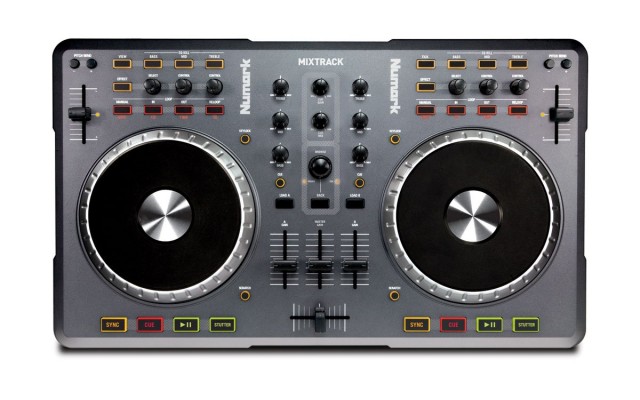
As a father of six years, I finally had my first “Holy crap, my child is going to be smarter than me!” moment.
Granted, I knew she was on to something when she started playing complex bass and treble clef chords on the piano — not to mention her ability to read music (I can only play by ear, and even then it’s only to poke around). I also like how she questions and shows an interest in almost anything.
But last week she reached a tipping point. I had gotten a new mixer (pictured) for Christmas. I was mixing some music and she immediately gravitated towards the mix deck. “You wanna try?” I asked.
She looked up with a beaming smile and nodding head.
I then proceeded to teach her about beat matching, BPM syncing, cross fading, pitch bends, and killing the bass of incoming songs to produce seamless transitions. After a little instruction, and help from Virtual DJs track visualizer, she blended her first mix: Deadmau5 + Rhiana.
I was blown away. I stepped out of the room to gloat to her mother, and while I was away she managed her second song blend. Lindsey and I just laughed, we were so impressed. A six-year old beat matching pop songs in the other room.
Look, I don’t expect nor particularly want Sadie to become a DJ. And she was only demonstrating initial interest; having fun doing something daddy does. But in that moment, I had a parental epiphany. I realized that I want to teach her everything I know (including art, science, writing, math, athletics, music, the whole she-bang) for as long as she’ll listen. Then she can combine the adopted disciplines learned from her mother and I and couple them with ones she discovers on her own to create something entirely new.
Now that’s what I call a mash-up.
 My dad won’t like me for repeating this on the intertubes, but it’s too good not to.
My dad won’t like me for repeating this on the intertubes, but it’s too good not to.
Growing up, my old man would regularly sneak off to his tiny toilet room to get away from his loud wife and six, know-it-all children. It was one of those “bathroom within a bathroom” type deals where the toilet had its own lockable door—you know, for added privacy and to keep the fumes from offending a significant other using the sinks, bath, or shower.
Funny thing is, that toilet room would have been claustrophobic for an undersized gnome. While sitting on the toilet, small children could have (and regularly did) touch opposing side walls with ease. It couldn’t have been longer than six feet.
Nevertheless, my dad would retreat there for what seemed like hours, reading Rand-McNally maps or whatever almanac or resource books he left in there. It was his sole sanctuary, that is until he took over the entire second floor after the kids left home.
As a stunning teenager, I remember thinking something like this: “Dude bought this big ole house and everything in it, and yet the only space he has to himself is a 6×3′ toilet room.”
Now, as the children have begun overrunning my own house, I have found myself in similar situations. Granted, I have it better than he did. I enjoy a private home office that is only occasionally open to the kids for impromptu dance sessions (since my desktop doubles as the house’s best hi-fi). And my “toilet room” is much larger than his.
But I still stay in the bathroom longer than I should. The only difference is instead of Rand-McNallys, an iPad comes with me.
(Note: I defer all flagging concerns to George Costanza)
 Since first subscribing to the daily paper this summer, I’ve been exposed to more Dear Abby columns than a 1950s trophy wife. The last one I read was horribly political, so I decided to guide the advice-seeker myself. Here goes:
Since first subscribing to the daily paper this summer, I’ve been exposed to more Dear Abby columns than a 1950s trophy wife. The last one I read was horribly political, so I decided to guide the advice-seeker myself. Here goes:
Dear Smooth Harold: My husband wanted to postpone having children until we were more financially secure. But I really wanted a baby, so he agreed, though only after I promised to return to work once the baby was born. That was a year ago. We now have a wonderful 2-month-old, and since “Avery” cam along, I realize how important it is for me to be at home with her. My husband disagrees. he says we need my salary in order to meet our financial obligations, and he is angry and upset that I won’t return to work. But I think there’s nothing as important as the nurturing a mother give her child. Who’s right?—R.F., Southern California
My reply:
Dear R.F.: Why on Earth would you ask me, a complete stranger, such an important question without knowing my background first? I could be a baby-snatcher for all you know, or completely against everything you believe in! But alas, perhaps you’re at your wits end and have no one to confide in. If that’s the case and you don’t feel comfortable anonymously researching different opinions online or posting to a message board, then I’ll indulge you. And I assure you I’m neither a baby-snatcher nor a posturing moral hypocrite. Continue reading…
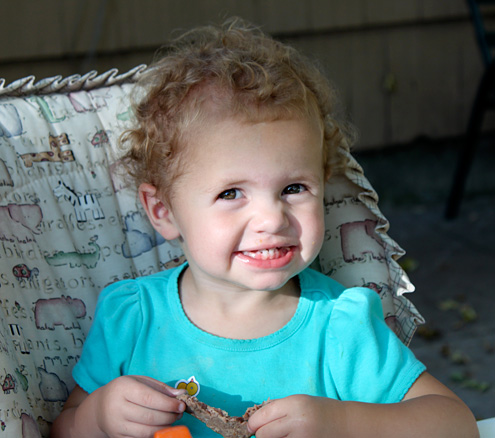
I didn’t think anyone could be more headstrong than my second child. The pictured cutie with Gene Wilder hair—my third—proved me wrong.
“No!” she answers without fail, even if it’s something she wants. She does it so often, I often mutter under my breath, “Don’t tell me no. I’m your father.”
It’s futile. I realize this. But it’s a coping mechanism.
Someday, however, I’d really like to speak my mind. “Stop telling me what to do!” I’ll say with authority. “I’m bigger than you!”
She’ll then look up to me with bright eyes—her face about to break into a cry. And I’ll cave.
How can something so small—a tenth of my weight, even— wield so much power?
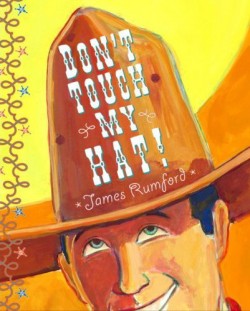 At my daughter’s request, I read James Rumford’s Don’t Touch My Hat (a family favorite) to her kindergarten class.
At my daughter’s request, I read James Rumford’s Don’t Touch My Hat (a family favorite) to her kindergarten class.
I tell ya: I felt som’n fierce having 15 pairs of innocent eyes look up to me from a cozy reading rug while showing and telling the story. As I read, there was a sanctity and innocence in the room I haven’t felt in a very long time—maybe not since leaving grade school.
Admittedly, I’ve done a lot of satisfying things this year. I’ve even managed a few professional coups. But this is unexpectedly near the top of my “most gratifying” list for not only this year, but previous years as an adult and father.
More than anything, I’m humbled and honored that my daughter invited me. Magic is soaking my spine. And Rumford is dead on: It’s your heart that counts, not your hat.
PS — Vampire Weekend, you have no idea. The kids do stand a chance. I’ve seen it in their eyes.
The baby woke at 8:00 am today. She downed her bottle in five minutes. Played for 30 minutes. Ate for 30 minutes. Then played for another 35 minutes before giving the univiersal “I’m tired” signal: She cried.
By 9:45, she was dozing off in her crib. She doesn’t always take a morning nap this early; sometimes she’ll go until 10 or maybe 10:30. But like clockwork, our other two did this as well.
Noting that, imagine if adults could only go two hours in the morning before requiring a nap. Corporate America would get grouchy and fussy by 10:00 am!
The May issue of Wired Magazine has a fascinated piece on injectable vasectomies that can be reversed with a follow-up shot. The procedure, dubbed by Wired as “the biggest advance in male birth control since the condom,” is flawless so far in clinical trials and dirt cheap to administer. Cool.
But I resent the article’s assertion that if successful, the procedure would “increase the chance” of humanity escaping poverty (p. 171). People aren’t poor because they have a lot of kids. They’re poor because they’re oppressed, complacent, or both. Offspring have nothing to do with personal wealth. (At least mine don’t, and I’m a freakin’ thousandaire!)
Of course, if you’re an absent parent and express your “love” in the form of material gifts, than yes—parenting children can be expensive. But otherwise, children have less impact than you think when it comes to a sinking or swimming family.
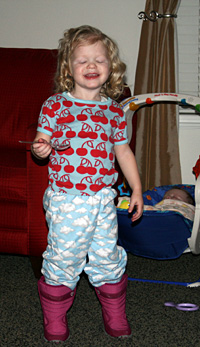 Music has always been a big part of my life. I’m good on my feet and have better rhythm than most other white men. Happily, my first-born (and subsequent children) share my affinity for song and dance.
Music has always been a big part of my life. I’m good on my feet and have better rhythm than most other white men. Happily, my first-born (and subsequent children) share my affinity for song and dance.
I first noticed Sadie’s liking to music when she began shaking her hips as six-month old — while I played “Africa Unite” by Bob Marley on a sunny afternoon. Amazingly, for what was then a first time parent, she was moving to the beat. How could this be? How does a human only 180 days old recognize, understand, and know how to dance to the beat?
It must be genetic.
To this day, Sadie spends a large portion of her time banging on piano keys, moving to the beat, strumming my guitar as she passes by, dancing to Kids Songs DVDs, and requesting playback of her hokey poky CD. She enjoys music more than most, as do I.
Did I pass it on to her? I don’t know, but I’m convinced there’s some inheritance involved. How couldn’t there be?
While I appreciate other forms of entertainment — like film, video games, and books — music would be the last thing to go in my book. It’s more than just entertainment, it sets the pace of life. And as corny as its sounds, song and dance makes everything better.
Originally published January 23, 2008
Now we have proof. Scientific proof that suggests couples with a disproportionate number of daughters like us tend to be more beautiful than those who conceive more sons.
Of course, since 50 percent of the world is female, that might also suggest that half of the world is beautiful, which can’t be right. (Thanks, Sara)
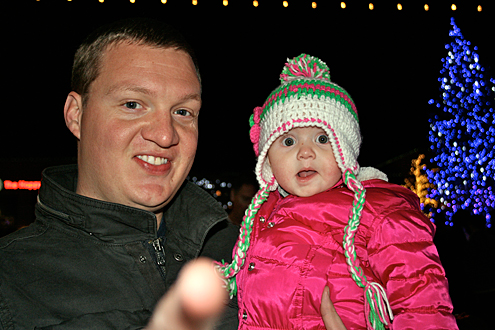
My first two kids are Mama’s Girls. They regularly lunge for their mother whenever shy or after being apart for a time.
And although the pictured cutie still reaches for her mother, it’s fun to see her get anxious with outstretched arms, ready for hold, upon seeing me. Especially since my other two just looked at me funny as babies.
I don’t confuse either behavior with love. But I’d be lying if I said it isn’t nice to be liked.
I know because it happened to me this week.
I was in the living room. My five year old was sitting beside her mother on the sofa. All of the sudden, I hear the former speaking in this foreign language. Not an idiom. Music notation! She was reading aloud music! Passing off her piano homework to her mother!
“My kid knows how to read music!!” I thought to myself. “Even I don’t know how to do that!!” (Yes, there were exclamation points after all of these sentences.)
I can only imagine what other things she’ll learn as she grows older — things I never did.
You have no idea how proud this makes me as a father. It makes me want to sing “We are the world” or something. What an awesome feeling.
MLIA
One of the most fascinating things I observe as a father is the seemingly useless genes I impart on my offspring. Things like collecting non-precious rocks at a young age and biting my lower lip when I see something cute or cuddly.
Although still amusing, seeing my temperament traits being passed on is expected. (You know, high energy, strong emotions, stuff like that.) Why on earth, then, is it so important for things like collecting junk or biting lips to persist? Would it be such a bad thing if people stopped collecting crap or making funny faces when they got excited?
Although I no longer fill my bottom drawer with non precious materials, I know my 2yo will. Just like I know my 4yo will probably bite her lower lip every freakin’ time she’s sees a kitten or encounters her cute little baby sister.
Just like her father.
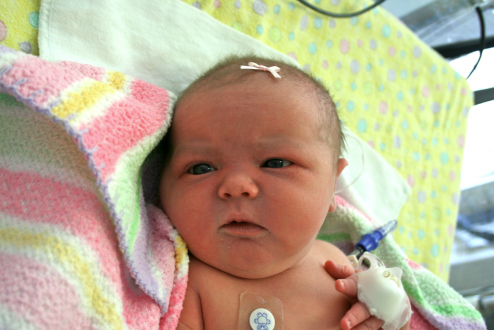
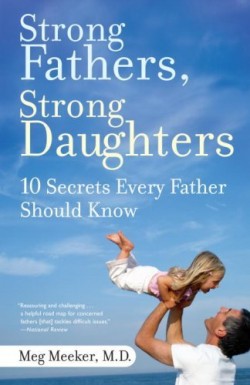
As the father of two girls, with another on the way, I’ll take all the help I can get concerning their well-being and development. And although it could have been written using fewer words, the 197-page Strong Fathers, Strong Daughters was an enlightening wake-up call to some of the challenges my daughters will likely face. After reading it, I felt empowered and reassured of the fathering techniques I already held to be true.
Written by Meg Meeker, a child psychiatrist and mother of four, the book is peppered with personal stories and alarming statistics. The stated “10 secrets” aren’t really secrets as much as their are good advice. To summarize, they are as follows: Continue reading…
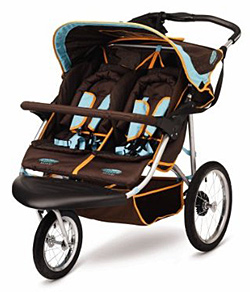 I had a bit of a senior moment this morning. While crossing over a contoured section of the sidewalk, I tripped over my toes, lunged forward, and overturned the jogging stroller. I landed in someone’s flower bed. The girls landed in the gutter—on their heads!
I had a bit of a senior moment this morning. While crossing over a contoured section of the sidewalk, I tripped over my toes, lunged forward, and overturned the jogging stroller. I landed in someone’s flower bed. The girls landed in the gutter—on their heads!
Moments before, a lady in her forties was approaching us. Being the gentleman that I am, I crossed onto the street to let her pass. I don’t know about other runners, but it takes my legs a good five minutes to warm in the morning. So at the time of the accident, I was dragging my feet a little. Hence, the stumble when crossing back over to the sidewalk.
Outside of insecurity and one hurt ego, everybody was fine. But I’ll be using that wrist strap religiously froim now on, so as not to send the girls rolling into the road the next time I trip.
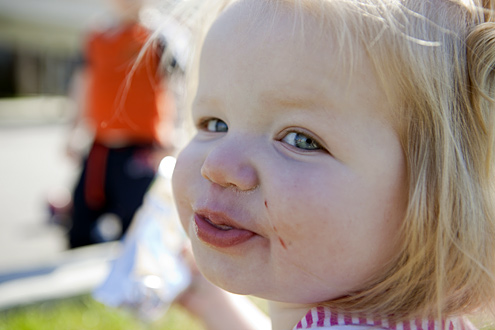
The rascal you see pictured above is my 1 and a half year old, Maddie. Lindsey and I often call her “The Destructor,” because she’s so rambunctious.
She also teases her elder sister Sadie—quite frequently.
I first noticed Maddie’s habit several months ago. If the girls are ever meant to share something, Maddie will usually dangle it in front of her sister, then rip it away at the last minute with a cute little chuckle grunt. Like her mother, Sadie would never do something like this, nor does she find pleasure in doing so.
Continue reading…
Last month, after an unresolved argument with my wife Lindsey, my three year old (Sadie) walked into my home office and on her own initiative asked, “Dad, are you being a jerk?”
Ouch. Her assumption was dead on. Out of frustration, I had been spiteful with her mother only moments before. I bashfully answered in the affirmative, and with her outreached hand in approval, proceeded to make amends with my better half, who was calmly sitting in the next room.
I knew from experience that kids say the darnedest things, but I had no idea they could cut to the core at such a young age. In any case, I’ll take all the help I can get.
As a parent, one of my biggest fears is having either my three or one year-old get into something nasty, like human secretions. So you know I squirmed in my feed reader after seeing this story, courtesy of a family friend. Take it away, Susan:
Yesterday, I went with a friend to the local jumping place with the kids. Of course the trampolines get old after a bit and the kids tend to wander into places they shouldn’t go. Maya decided to try the bathroom out. I followed her in there not seconds after to find she had just taken the lovely green tampon applicator out of the nasty toilet trash. Yes..in the mouth it went. GROSS. Okay, so I made this big scream and pretty much barfed in my mouth and am still barfing right now, flicked the NASTY green lollipop tampon applicator on the floor and washed her mouth out until she squirmed out of my arms screaming.
As if I needed more motivation in developing Nazi public restroom habits pertaining to my kids.
Confession: We do not shut bathroom doors in our house while relieving ourselves, that is unless guests are over.
Lindsey and I inadvertently started the bad habit as newlyweds living in a small condo, wanting to maximize our conversation time. The practice has stuck, and often times one of use will even sit in the hallway to carry on a conversation, as if the other was merely sitting down as opposed to going to the bathroom. I guess we’re a modern day Adam’s Family.
Last week, I was making lunch for the girls while Sadie, our three-year old, dispensed u-boats in the guest bathroom toilet. As usual, the bathroom door was wide open so Sadie and I could talk should the “urge” arise. It didn’t take long.
Continue reading…
 For reasons beyond me, my three year old has begun using her hair clips to lock all the doors in our house. With clip in hand, sure turns the outside locks from the horizontal position to vertical, “to keep things safe,” she tells me.
For reasons beyond me, my three year old has begun using her hair clips to lock all the doors in our house. With clip in hand, sure turns the outside locks from the horizontal position to vertical, “to keep things safe,” she tells me.
In honesty, it’s been kind of annoying over the last two weeks. I’m forced to grab a nickle almost every time to unlock either the bathroom, office, or bedroom.
Last night, I went to check on my sleeping 1 year old. I turned the knob, and of course, it was locked. Rather than becoming frustrated, however, I found a nickel and smiled — perhaps this is my daughter’s way of reminding me she’s here.
 In January, I made the switch from an unlimited data plan to email only. This means I no longer have access to T-Mobile internet.
In January, I made the switch from an unlimited data plan to email only. This means I no longer have access to T-Mobile internet.
I had the unlimited data plan for two years (service is a little slow, but still convenient), but I’m happy to report I’m doing fine, saving a little money, and likely to father fewer Blackberry orphans as a result of my downgrade.
What’s more, my trusty Curve supports Wi-Fi, so if I really need access to the internet on my phone while not at home, it’s not that difficult to find a public connection.
For as technologically inclined as I am, it’s ironic how technology averse I can be, in an effort to maintain some level of privacy and social sanity. Do you ever feel the same?
“That not look good, daddy,” my clever, almost 3-year old girl said in broken but piercing English on Monday, upon seeing my newly purchased white leather belt around my waist. “That looks better,” she assured me, after I switched to a brown belt.
My confidence in fashion judgment is at an all time low right now. To make matters worse, Sadie told me I was “stinky” over the weekend. Great — out of style and stinky. Just what I need.






 I was recently asked what I know for sure. I didn’t have time to answer everything in detail, but upon further reflection, this is what I would have told them.
I was recently asked what I know for sure. I didn’t have time to answer everything in detail, but upon further reflection, this is what I would have told them.




 How can parents help their children to manage and overcome stress?
How can parents help their children to manage and overcome stress?
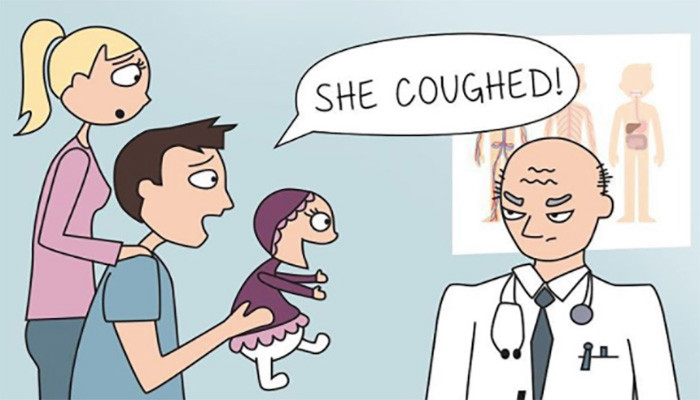







 Build character, not intelligence. That’s the gist of what parents, educators, and society should do to help children succeed, argues Paul Tough in
Build character, not intelligence. That’s the gist of what parents, educators, and society should do to help children succeed, argues Paul Tough in 
 Six years ago, I wrote about
Six years ago, I wrote about 
 My dad won’t like me for repeating this on
My dad won’t like me for repeating this on  Since first subscribing to the
Since first subscribing to the 

 Music has always been a big part of my life. I’m good on my feet and have better rhythm than most other white men. Happily, my first-born (and subsequent children) share my affinity for song and dance.
Music has always been a big part of my life. I’m good on my feet and have better rhythm than most other white men. Happily, my first-born (and subsequent children) share my affinity for song and dance.


 I had a bit of a senior moment this morning. While crossing over a contoured section of the sidewalk, I tripped over my toes, lunged forward, and overturned the jogging stroller. I landed in someone’s flower bed. The girls landed in the gutter—on their heads!
I had a bit of a senior moment this morning. While crossing over a contoured section of the sidewalk, I tripped over my toes, lunged forward, and overturned the jogging stroller. I landed in someone’s flower bed. The girls landed in the gutter—on their heads!
 For reasons beyond me, my three year old has begun using her hair clips to lock all the doors in our house. With clip in hand, sure turns the outside locks from the horizontal position to vertical, “to keep things safe,” she tells me.
For reasons beyond me, my three year old has begun using her hair clips to lock all the doors in our house. With clip in hand, sure turns the outside locks from the horizontal position to vertical, “to keep things safe,” she tells me. In January, I made the switch from an unlimited data plan to email only. This means I no longer have access to T-Mobile internet.
In January, I made the switch from an unlimited data plan to email only. This means I no longer have access to T-Mobile internet.